通用人教版九年级英语全一册单元导学案集
- 格式:docx
- 大小:148.66 KB
- 文档页数:44
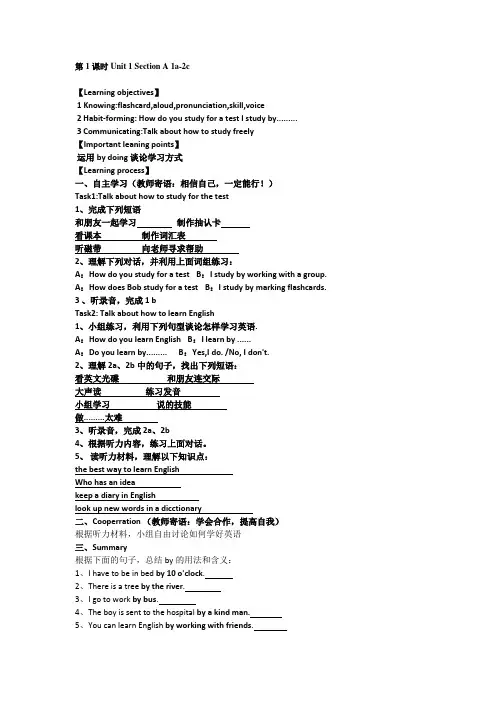
第1课时 Unit 1 Section A 1a-2c【Learning objectives】1 Knowing:flashcard,aloud,pronunciation,skill,voice2 Habit-forming: How do you study for a test I study by.........3 Communicating:Talk about how to study freely【Important leaning points】运用by doing 谈论学习方式【Learning process】一、自主学习(教师寄语:相信自己,一定能行!)Task1:Talk about how to study for the test1、完成下列短语和朋友一起学习制作抽认卡看课本制作词汇表听磁带向老师寻求帮助2、理解下列对话,并利用上面词组练习:A:How do you study for a test B:I study by working with a group. A:How does Bob study for a test B:I study by marking flashcards.3 、听录音,完成1 bTask2: Talk about how to learn English1、小组练习,利用下列句型谈论怎样学习英语.A:How do you learn English B:I learn by ......A:Do you learn by......... B:Yes,I do. /No, I don't.2、理解2a、2b中的句子,找出下列短语:看英文光碟和朋友连交际大声读练习发音小组学习说的技能做.........太难3、听录音,完成2a、2b4、根据听力内容,练习上面对话。
5、读听力材料,理解以下知识点:the best way to learn EnglishWho has an ideakeep a diary in Englishlook up new words in a dicctionary二、Cooperration (教师寄语:学会合作,提高自我)根据听力材料,小组自由讨论如何学好英语三、Summary根据下面的句子,总结by的用法和含义:1、I have to be in bed by 10 o'clock.2、There is a tree by the river.3、I go to work by bus.4、The boy is sent to the hospital by a kind man.5、You can learn English by working with friends.四、诊断评价(一)补全单词:1、It's a good way to read a2、The boy often l up the words in the dictionary.3、Do you have an i about weekend4、K a diary helps to write English every day.5、The girl often learn by a the teacher for help.6、What about reading about to practise p(二)补全短文:A:Tom,I know you (数学学的很好)last do you learn math B:I learnt it (通过做很多题)A:What elseB: (通过向老师寻求帮助)A:Did you learn (通过小组学习)B: Yes, i did. ( Lucy也是)【课后反思】(教师寄语:从不断反思中完善自己,提高自己)第2课时 Unit 1 SectionA 3a-4【Learning objectives】: specific, memorize, grammar, differently, frustrate, frusrating, quickly, add,not at all, excited, end up.:Be able to understand the meaning of the passage in 3a.: ---How do you learn English---I often write vocabulary lists.【Important points】:Be able to understand the meaning of the passage in 3a.: ---How do you learn English---I often write vocabulary lists.【Learning process】一、自主学习Task1学习第4部分短语,谈论自己如何学习英语。
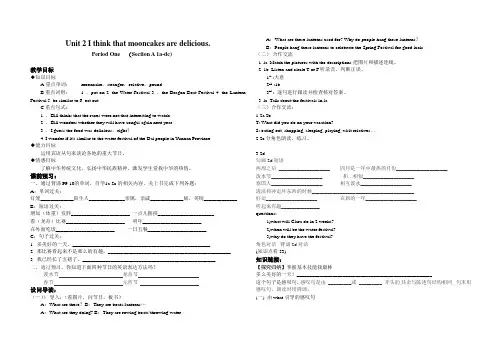
Unit 2 I think that mooncakes are delicious.Period One (Section A 1a-dc)教学目标◆知识目标A.重点单词:mooncake,stranger,relative,poundB.重点词组: 1 .put on 2. the Water Festival 3 .the Dragon Boat Festival 4. the Lantern Festival 5. be similar to 6. eat outC.重点句式:1 .Bill thinks that the races were not that interesting to watch.2 .Bill wonders whether they will have zongzi again next year.3 .I guess the food was delicious,right?4. I wonder if it's similar to the water festival of the Dai people in Yunnan Province.◆能力目标运用宾语从句来谈论各地的重大节日。
◆情感目标了解中华传统文化,弘扬中华民族精神,激发学生爱我中华的热情。
课前预习:一、通过背诵P9-10的单词,自学1a-2c的相关内容,关上书完成下列各题:A:单词过关:灯笼_____________陌生人______________亲属,亲戚_____________磅,英镑_____________ B:短语过关:增加(体重)发胖_______________________ 一点儿拥挤______________________看(龙舟)比赛_______________________ 明年_______________________在外面吃饭_______________________ 一日五餐_______________________C:句子过关:1. 多美好的一天。
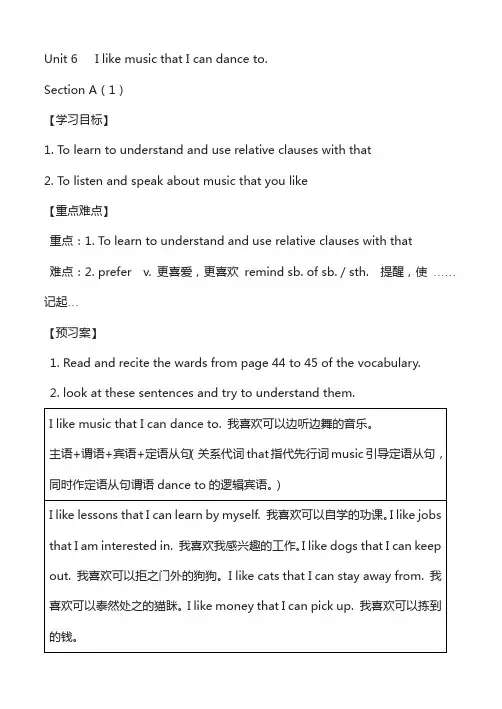
Unit 6 I like music that I can dance to.Section A(1)【学习目标】1. To learn to understand and use relative clauses with that2. To listen and speak about music that you like【重点难点】重点:1. To learn to understand and use relative clauses with that难点:2. prefer v. 更喜爱,更喜欢 remind sb. of sb. / sth. 提醒,使……记起…【预习案】1. Read and recite the wards from page 44 to 45 of the vocabulary.2. look at these sentences and try to understand them.I like music that I can dance to. 我喜欢可以边听边舞的音乐。
主语+谓语+宾语+定语从句(关系代词that指代先行词music引导定语从句,同时作定语从句谓语dance to的逻辑宾语。
)I like lessons that I can learn by myself. 我喜欢可以自学的功课。
I like jobs that I am interested in. 我喜欢我感兴趣的工作。
I like dogs that I can keep out. 我喜欢可以拒之门外的狗狗。
I like cats that I can stay away from. 我喜欢可以泰然处之的猫眯。
I like money that I can pick up. 我喜欢可以拣到的钱。
【探究案】1. prefer v. 更喜爱,更喜欢choose sth. rather than sth. else; like sth. better1) prefer + n. eg.I prefer groups that play quiet and gentle songs. 我更喜欢演唱轻柔音乐的组合。
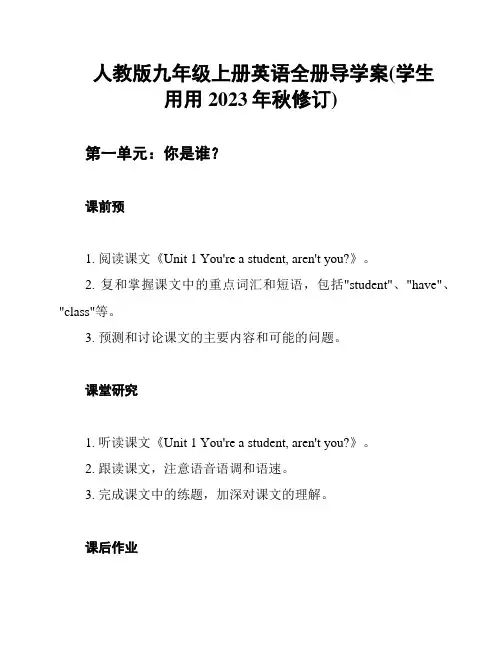
人教版九年级上册英语全册导学案(学生用用2023年秋修订)第一单元:你是谁?课前预1. 阅读课文《Unit 1 You're a student, aren't you?》。
2. 复和掌握课文中的重点词汇和短语,包括"student"、"have"、"class"等。
3. 预测和讨论课文的主要内容和可能的问题。
课堂研究1. 听读课文《Unit 1 You're a student, aren't you?》。
2. 跟读课文,注意语音语调和语速。
3. 完成课文中的练题,加深对课文的理解。
课后作业1. 背诵和默写课文中的重点句子。
2. 扩展课文中的对话,用自己的话描述一下自己是谁,并询问对方的身份。
3. 总结课文中的语法知识点,如否定句和一般疑问句的构成。
第二单元:我的课程课前预1. 阅读课文《Unit 2 What classes do you have?》。
2. 复和掌握课文中的重点词汇和短语,包括"course"、"like"、"math"等。
3. 预测和讨论课文的主要内容和可能的问题。
课堂研究1. 听读课文《Unit 2 What classes do you have?》。
2. 跟读课文,注意语音语调和语速。
3. 完成课文中的练题,加深对课文的理解。
课后作业1. 背诵和默写课文中的重点句子。
2. 用英语列举出你所上的课程,并描述你对每门课程的感受。
3. 总结课文中的语法知识点,如可数与不可数名词的用法。
第三单元:我的家人课前预1. 阅读课文《Unit 3 My family》。
2. 复和掌握课文中的重点词汇和短语,包括"family"、"sister"、"father"等。
3. 预测和讨论课文的主要内容和可能的问题。
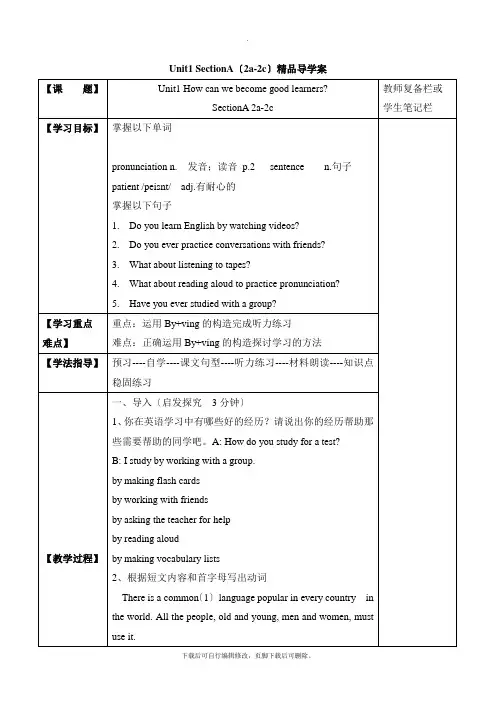
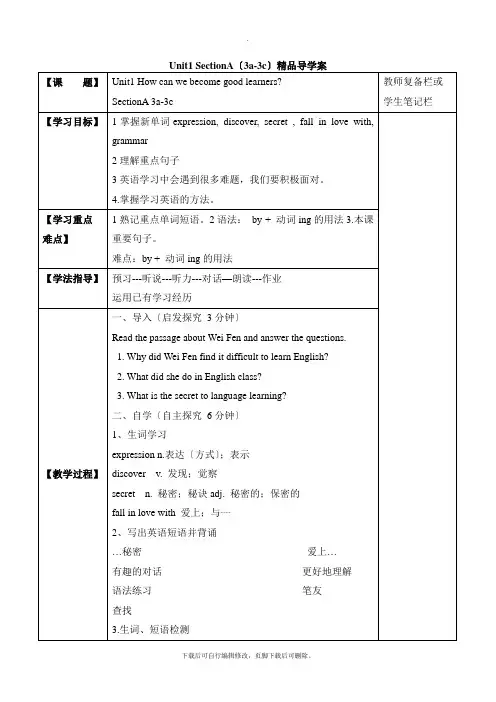
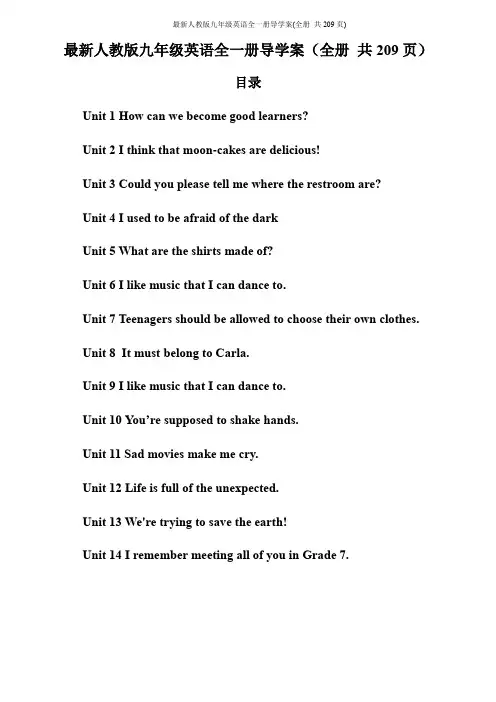
最新人教版九年级英语全一册导学案(全册共209页)目录Unit 1 How can we become good learners?Unit 2 I think that moon-cakes are delicious!Unit 3 Could you please tell me where the restroom are?Unit 4 I used to be afraid of the darkUnit 5 What are the shirts made of?Unit 6 I like music that I can dance to.Unit 7 Teenagers should be allowed to choose their own clothes.Unit8It must belong to Carla.Unit 9 I like music that I can dance to.Unit10You’re supposed to shake hands.Unit 11 Sad movies make me cry.Unit 12 Life is full of the unexpected.Unit 13 We're trying to save the earth!Unit 14 I remember meeting all of you in Grade 7.Unit 1 How can we become good learners?to be patient4. Try to guess a word’s meaning by reading the sentences before and after it.sentence n.Please use this word to make a sentence. make a sentence 五、练评(包含“考点链接” 应用探究 6分钟) 单项选择。
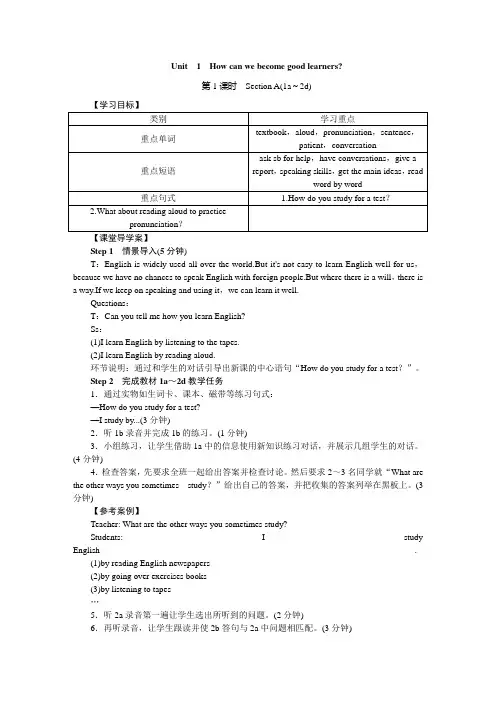
Unit 1How can we become good learners?第1课时Section A(1a~2d)【学习目标】Step 1情景导入(5分钟)T:English is widely used all over the world.But it's not easy to learn English well for us,because we have no chances to speak English with foreign people.But where there is a will,there is a way.If we keep on speaking and using it,we can learn it well.Questions:T:Can you tell me how you learn English?Ss:________________________________________________________________________(1)I learn English by listening to the tapes.(2)I learn English by reading aloud.环节说明:通过和学生的对话引导出新课的中心语句“How do you study for a test?”。
Step 2完成教材1a~2d教学任务1.通过实物如生词卡、课本、磁带等练习句式:—How do you study for a test?—I study by...(3分钟)2.听1b录音并完成1b的练习。
(1分钟)3.小组练习,让学生借助1a中的信息使用新知识练习对话,并展示几组学生的对话。
(4分钟)4.检查答案,先要求全班一起给出答案并检查讨论。
然后要求2~3名同学就“What are the other ways you sometimes study?”给出自己的答案,并把收集的答案列举在黑板上。
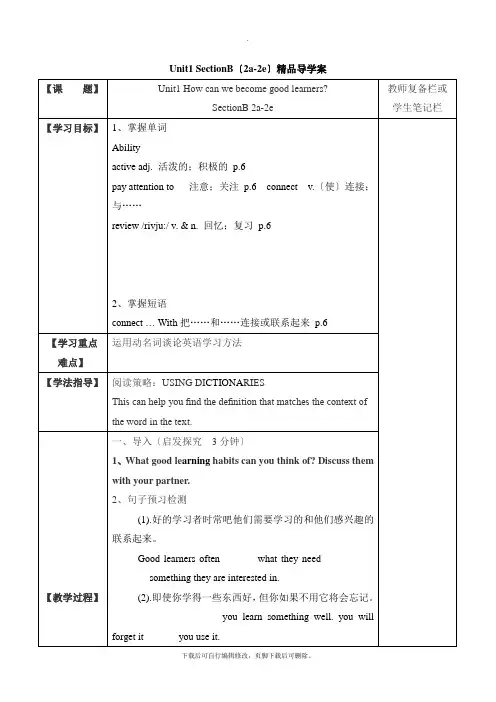
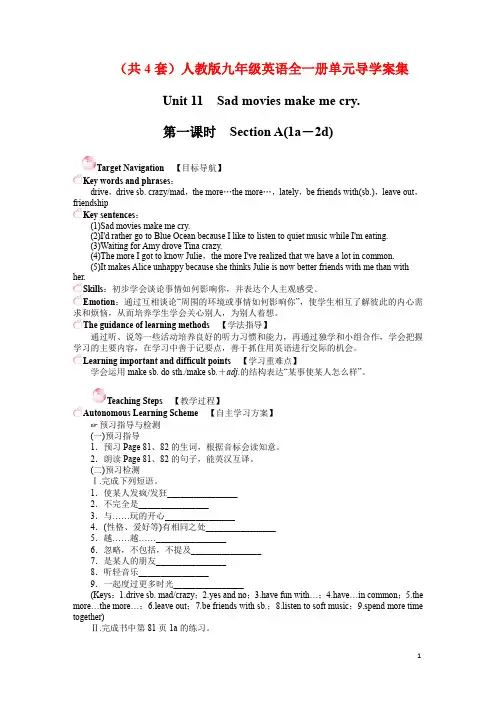
(共4套)人教版九年级英语全一册单元导学案集Unit 11Sad movies make me cry.第一课时Section A(1a-2d)Target Navigation【目标导航】Key words and phrases:drive,drive sb. crazy/mad,the more…the more…,lately,be friends with(sb.),leave out,friendshipKey sentences:(1)Sad movies make me cry.(2)I'd rather go to Blue Ocean because I like to listen to quiet music while I'm eating.(3)Waiting for Amy drove Tina crazy.(4)The more I got to know Julie,the more I've realized that we have a lot in common.(5)It makes Alice unhappy because she thinks Julie is now better friends with me than with her.Skills:初步学会谈论事情如何影响你,并表达个人主观感受。
Emotion:通过互相谈论“周围的环境或事情如何影响你”,使学生相互了解彼此的内心需求和烦恼,从而培养学生学会关心别人,为别人着想。
The guidance of learning methods【学法指导】通过听、说等一些活动培养良好的听力习惯和能力,再通过独学和小组合作,学会把握学习的主要内容,在学习中善于记要点,善于抓住用英语进行交际的机会。
Learning important and difficult points【学习重难点】学会运用make sb. do sth./make sb.+adj.的结构表达“某事使某人怎么样”。
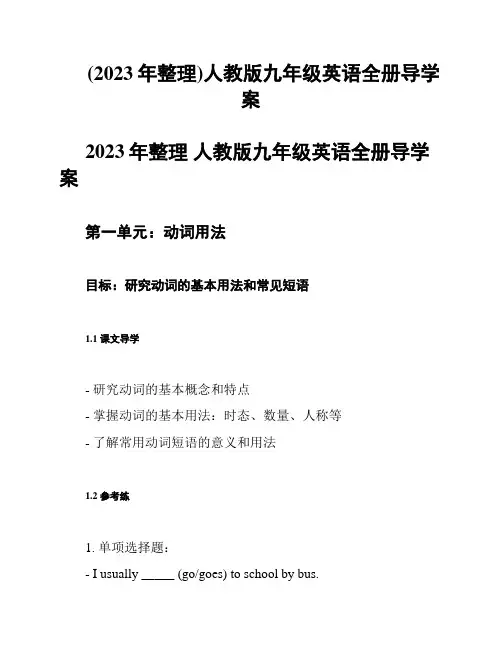
(2023年整理)人教版九年级英语全册导学案2023年整理人教版九年级英语全册导学案第一单元:动词用法目标:研究动词的基本用法和常见短语1.1 课文导学- 研究动词的基本概念和特点- 掌握动词的基本用法:时态、数量、人称等- 了解常用动词短语的意义和用法1.2 参考练1. 单项选择题:- I usually _____ (go/goes) to school by bus.- They _____ (is/are) cleaning the classroom now.2. 完成句子:- He has ______ (do) his homework already.- We will ______ (not go) swimming tomorrow.1.3 拓展练1. 写一篇100字以上的短文,描述你喜欢做的一件事情。
要求使用动词的各种时态。
2. 根据所给情景,完成对话。
(请参考附件D)课堂作业- 完成参考练1.2和1.3- 阅读并预第二单元内容---第二单元:阅读理解目标:培养阅读理解能力,提高阅读速度和思维逻辑思维能力2.1 课文导学- 研究阅读理解的基本方法和技巧- 掌握理解课文的关键信息- 提升阅读速度和理解能力2.2 参考练1. 阅读短文,并回答问题:- When is Halloween celebrated?- What costume did the girl wear?- How did they celebrate Halloween?2. 根据短文内容,填写下面表格:| Name | Age | Favorite Sport |2.3 拓展练1. 阅读一篇新闻报道,并写一篇100字以上的摘要。
2. 分析一篇英文演讲稿,写出主要论点和支持论据。
课堂作业- 完成参考练2.2和2.3- 预下一单元内容---第三单元:口语表达目标:提高口语表达能力和自信心3.1 课文导学- 研究常用口语表达方式和惯用语- 掌握日常对话中常见的口语表达方式- 培养口语思维的能力3.2 参考练1. 根据图片提示,描述其中的内容,并使用合适的口语表达方式。
人教版九年级英语(全册)精品导学案汇总Unit 4课下能力提升(一) (2)Unit 4课下能力提升(二) (14)Unit 4课下能力提升(三) (24)Unit 4课下能力提升(四) (35)Unit 5课下能力提升(五) (46)Unit 5课下能力提升(六) (58)Unit 5课下能力提升(七) (68)Unit 5课下能力提升(八) (75)Unit 6课下能力提升(九) (78)Unit 6课下能力提升(十) (90)Unit 6课下能力提升(十一) (102)Unit 6课下能力提升(十二) (119)单元质量检测(一) (134)单元质量检测(二) (154)单元质量检测(三) (178)Unit 4课下能力提升(一)Ⅰ.单词拼写1.When an animal is under ________ (攻击), it chooses to run away or fight back.2.My wallet has ________ (消失) from the table.3.It is ________ (明显的) that she is very clever.4.I feel bad that I didn't ________ (提供) any food to them.5.The ________ (破坏) of the natural living places makes wild animals less and less.6.Profits of all companies are being a________ by the economic crisis.7.Since you know smoking does great h________ to your health, why not give it up?8.By keeping a diary, you can improve your writing skills more r________.9.Our washing machine broke down yesterday and f________ the kitchen.10.The plane c________ into the mountain, but luckily the pilot survived.Ⅱ.单句语法填空1.Everybody in the village likes Jack because he is good at telling and making ________ jokes.2.Organizations of all kinds now recognize the Internet as effective means for ________ (globe) communication.3.At dawn the army ________ (attack) the town and finally captured it.4.She could have been ________ focus of everyone's attention, but to her disappointment, all people in the picture were out ________ focus.5.It was never clear ________ the man hadn't reported the accident sooner.6.—I'll give Bob a ring.—You should. You haven't been in touch ________ him for ages.7.He wishes to become a football star and hopes it will come ________ some day.8.The audience complained that too much advertising ________ (affect) the quality of the programs.Ⅲ.完成句子1. Look at the dark clouds in the sky. It looks ______________________________________ (好像要下雨).2.______________________ (真遗憾) you couldn't come to my birthday party.3.______________________ (很显然) she will marry him.Ⅳ.课文缩写语法填空In the last thirty years, the Internet has grown 1.________,and this growth is clearly going to continue.Some experts are pessimistic 2.________ the future.One worry is crime in cyberspace.In the future, terrorists may “attack”the world's computers, cause chaos, make planes 3.________ trains crash.4.________,many people are optimistic about the future of 5.________ Internet.Already, users can buy books, find out about holiday offers and so on.Angela Rossetto believes that, in the future, we will get6.________(entertain) from the Net and that television will probably7.________(appear). The mail service may also vanish (消失) with the increasing use of e?mail.Some experts see our future in virtual 8.________ (real) —the use of computers with sounds and pictures 9.________ make you feel as if you are in 10.________ real situation.Ⅴ.完形填空Dear Mr Armstrong,I was pleased to receive your letter, asking what advice I would give to the members of your club. In my opinion, __1__ field offers greater __2__ than newspaper work for young people with __3__ in writing.Of course I'm not speaking of __4__ rewards. Anyone who wants to get rich should choose some other __5__. I can't even promise you excitement. A newspaper reporter might have to __6__ the same dutiesday after day. But journalism pays a living wage, and it often makes a reporter feel more __7__ than a bank president. Who can say that he is not?You have asked me __8__ to become a journalist.First, learn how to __9__ a computer. This is one thing you must be able to do. You can either learn the __10__ in school or buy a book that __11__ how to teach yourself.At school you should learn how to read and write your own __12__ well. You should also learn history, government, mathematics and __13__. Foreign languages are also good to know. The things that __14__ every day are not simple, and a journalist has to know__15__ in order to understand them.If your school has a __16__,you should write for it. Editors like young people who have had experience __17__ for school papers.There are many things you can do to prepare __18__ for a newspaper job. Read everything you can, __19__ newspapers and magazines. Discuss what you read and __20__ your own opinions.If the members of your club have any questions that haven't been answered by this letter, please write again.YoursEditor, NYT1.A.this B.noC.every D.each 2.A.awards B.rewards C.returns D.advantage 3.A.an interest B.excitement C.curiosity D.a love 4.A.spiritual B.individual C.collective D.material 5.A.position B.school C.occupation D.business 6.A.face B.perform C.carry D.take 7.A.wealthy B.excited C.important D.burdened 8.A.how B.whether C.when D.where 9.A.fix B.find C.use D.get 10.A.subject B.ability C.knowledge D.skill 11.A.writes B.reads C.introduces D.explains 12.A.book B.languageC.homework D.notes13.A.physics B.scienceC.English D.biology14.A.happen B.existC.show D.appear15.A.a lot B.a littleC.a bit D.a few16.A.club B.textbookC.newspaper D.library17.A.editing B.printingC.paying D.working18.A.yourself B.ourselvesC.themselves D.itself19.ly B.certainlyC.especially D.specially20.anize B.changeC.form D.makeⅥ.阅读理解Tim Berners?Lee is the man who wrote the software programme that led to the foundation of the World Wide Web. Britain played an important part in developing the first generation of computers. Theparents of Tim Berners?Lee both worked on one of the earliest commercial computers and talked about their work at home. As a child he would build models of computers from packaging material. After graduating from Oxford University he went on to the real thing. In the 1980's, scientists were already using a primitive version (原始版本) of e?mail. While working at a laboratory in Switzerland Tim Berners?Lee wrote a programme which let him store these messages. In 1990 he wrote the HTTP (服务程序所用的协议) and HTML (超文本链接标示语言) programmes which form the basis of the World Wide Web.The next year his programmes were placed on to the Internet. Everyone was welcome to use them and improve them if they could. Programmers used his codes to work with different operating systems. New things like web browsers (浏览器) and search engines were developed. Between 1991 and 1994 the number of web pages rose from 10 to 100, 000.In 1994 Tim Berners?Lee formed the newly formed World Wide Web Consortium (协会) or W3C.More than 200 leading companies and laboratories are represented (代表) by W3C.Together they make sure that everyone can participate equally on the Web.1.The main idea of this passage is ________.A.when the Internet appearedB.how Tim Berners?Lee formed W3CC.why computers develop so rapidlyD.how the World Wide Web started2.Scientists began to use e?mail ________.A.in 1980 B.after the 1980'sC.in the 1980's D.in the 1960's3.Which of the following is NOT true?A.The number of web pages rose very rapidly in the 1990's.B.Tim's programmes were placed on to the Internet in 1990.C.The World Wide Web will have an effect (影响) on social development.D.Tim Berners-Lee made a great contribution to the computer science.课下能力提升(一)Ⅰ.1.attack 2.disappeared 3.obvious4.offer 5.destruction 6.affected7.harm8.rapidly9.flooded10.crashedⅡ.1.up 2.global 3.attacked 4.the; of 5.why 6.with7.true 8.has affectedⅢ.1.as if it's going to rain 2.It's a pity that3.It's obvious thatⅣ.1.rapidly 2.about 3.and 4.However5.the 6.entertainment7.disappear8.reality9.that/which10.aⅤ.语篇解读:本文是一封回信,回答了来信中提出的问题,并对有兴趣从事新闻工作的人提出了建议。
最新人教版九年级英语全一册导学案第一单元:Making a Difference1.1 Unit Overview本单元主要介绍了如何通过做出积极影响来改变世界。
学生将学习一些社会公益组织的工作以及如何参与其中。
通过这个单元,学生将培养自己的改变世界的意识。
1.2 Learning Objectives本单元学习目标如下:•了解一些社会公益组织的工作。
•引导学生参与社会公益组织的活动。
•提高学生的口语表达和写作能力。
•培养学生的团队合作和领导能力。
1.3 Teaching Resources本单元所需要的教学资源如下:•人教版九年级英语全一册教材•多媒体设备•学生参与的社会公益组织信息1.4 Lesson Plan下面是本单元的教学安排推荐:课时教学内容学习活动1Introduction toUnit 观看介绍公益组织的视频,讨论其重要性和影响。
2The Power of One学生小组内讨论如何一个人能够改变世界。
3SocialOrganizations 学生小组研究不同社会公益组织的工作。
4Taking Action分组讨论并确定一个公益项目,制定行动计划。
5Presentations各小组展示他们的社会公益项目,并相互评价。
6Reflection andReview 学生写一篇关于此单元学习经历和收获的反思文章。
1.5 Assessment学生将通过以下方式进行考核:•参与小组讨论和展示的表现评价。
•行动计划的设计和执行能力。
•反思文章的书写和表达能力。
1.6 Extension Activities为了提高学生对公益事业的认识和参与度,可以开展以下延伸活动:•参观当地的公益组织或参与志愿者活动。
•组织学生自发开展公益项目并进行实施。
•建立学生公益社团,持续进行公益活动。
第二单元:Travel and Adventure2.1 Unit Overview本单元主要介绍了不同类型的旅行和探险,展示了不同文化和地理环境的魅力。
最新人教版九年级英语上册导学案(全册) Unit 1: Hello!- 研究目标:了解如何问候和介绍自己- 核心词汇:- 问候:hello, hi- 介绍自己:I'm..., My name is...- 重点句型:- 问候语句:Hello! Hi!- 自我介绍句:I'm Linda. My name is Tom.Unit 2: How do you spend your day?- 研究目标:描述日常活动- 核心词汇:- 日常活动:get up, have breakfast, go to school, study, play sports, have dinner, go to bed- 重点句型:- 描述日常活动:I get up at 7 o'clock. I have breakfast at 8 o'clock.Unit 3: How much is it?- 研究目标:研究购物和问价格- 核心词汇:- 购物:buy, shop, store- 价格:how much, expensive, cheap- 重点句型:- 问价格:How much is the T-shirt? It's 50 yuan. Unit 4: What's the weather like today?- 研究目标:谈论天气状况- 核心词汇:- 天气:weather- 天气状况:sunny, cloudy, rainy, snowy- 重点句型:- 谈论天气:What's the weather like today? It's sunny. ...(继续编写其他单元的导学案)总结:本册导学案主要包括九年级英语上册各个单元的核心词汇、学习目标和重点句型,旨在帮助学生更好地掌握课程内容。
通过学习这些导学案,学生可以增强他们的英语听说读写能力,提高英语表达的准确性,为下学期的学习打下坚实的基础。
人教版九年级英语全册导学案第1课时Unit 1 Section A 1a-2c【Le arning objectives】1 Knowing:flashcard,aloud,pronunciation,skill,voice2 Habit-forming: How do you study for a test? I study by.........3 Communicating:Talk about how to study freely【Important leaning points】运用by doing 谈论学习方式【Learning process】一、自主学习(教师寄语:相信自己,一定能行!)Task1:Talk about how to study for the test1、完成下列短语和朋友一起学习制作抽认卡看课本制作词汇表听磁带向老师寻求帮助2、理解下列对话,并利用上面词组练习:A:How do you study for a test? B:I study by working with a group.A:How does Bob study for a test? B:I study by marking flashcards.3 、听录音,完成1 bTask2: Talk about how to learn English1、小组练习,利用下列句型谈论怎样学习英语.A:How do you learn English? B:I learn by ......A:Do you learn by.........? B:Yes,I do. /No, I don't.2、理解2a、2b中的句子,找出下列短语:看英文光碟和朋友连交际大声读练习发音小组学习说的技能做.........太难3、听录音,完成2a、2b4、根据听力内容,练习上面对话。
5、读听力材料,理解以下知识点:the best way to learn EnglishWho has an idea?keep a diary in Englishlook up new words in a dicctionary二、Cooperration (教师寄语:学会合作,提高自我)根据听力材料,小组自由讨论如何学好英语?三、Summary根据下面的句子,总结by的用法和含义:1、I have to be in bed by 10 o'clock.2、There is a tree by the river.3、I go to work by bus.4、The boy is sent to the hospital by a kind man.5、You can learn English by working with friends.四、诊断评价(一)补全单词:1、It's a good way to read a2、The boy often l up the words in the dictionary.3、Do you have an i about weekend?4、K a diary helps to write English every day.5、The girl often learn by a the teacher for help.6、What about reading about to practise p?(二)补全短文:A:Tom,I know you (数学学的很好)last term.How do you learn math?B:I learnt it (通过做很多题) A:What else?B: (通过向老师寻求帮助)A:Did you learn ?(通过小组学习)B: Yes, i did. ( Lucy也是)【课后反思】(教师寄语:从不断反思中完善自己,提高自己)第2课时Unit 1 SectionA 3a-4【Learning objectives】1.Knowing: specific, memorize, grammar, differently, frustrate, frusratin g, quickly, add,not at all, excited, end up.2.Understanding:Be able to understand the meaning of the passage in 3 a.municating: ---How do you learn English?---I often write vocabulary lists.【Important points】1.Understanding:Be able to understand the meaning of the passage in 3 a.municating: ---How do you learn English?---I often write vocabulary lists.【Learning process】一、自主学习Task1学习第4部分短语,谈论自己如何学习英语。
人教版新目标初中英语九年级教案导学案Unit 1 How do you study for a testSection A(1a-2c)学习目标1.通过交流和表达,进一步掌握学习英语的技巧与方法。
2.掌握下列知识点:■重点词汇:f1ashcard,vocabulary,pronunciation,a1oud■重点短语:①study for②make flashcard③make vocabulary lists④ask the teacher for help⑤read aloud ⑥study with a group■重点句型:①How do you study for a test? ②What abou tlistening to tapes?■语法:by+μing的用法预习导学预习单词,完成下列各词。
1.抽认卡2.词汇3.Aloud(近义词)4.发音(名词)5.ever(反义词)6.1isten(现在分词)7.study(过去分词)8.(如何)do you study for a test?合作研讨一、重点单词与短语1.pronunciation n.发音;发音法,其动词形式pronounce【跟踪训练】(1)她认识很多法语单词,但发音不正确。
She knows a lot of French;words,but them incorrectl.2.Aloud adv.出声地;大声地例如:read aloud大声朗读【辨析】aloud/loud/loudlyaloud出声地;大声地。
常与read,call等动词连用,loud高声地;大声地;喧闹地。
常用于talk,speak等动词之后;loudly高声地;喧闹地。
一般可以和10ud互换,但含有“吵闹”的意思。
【跟踪训练】(2)老师要求我大声朗读课文。
The teacher asked me to the text .(3)请大声点说,以便我能听清楚。
第 1 课时Unit 1 Section A 1a-2c【Lear ning objectives 】1 Knowin g:flashcard,aloud,pro nun ciatio n,skill,voice2 Habit-forming: How do you study for a test? I study by ............................................3 Communicating:Talk about how to study freely【Importa nt lea ning points 】运用by doing谈论学习方式【Learning process 】一、自主学习(教师寄语:相信自己,一定能行!)Task1:Talk about how to study for the test1、完成下列短语和朋友一起学习__________________________________________________ 制作抽认卡______________________________________看课本制作词汇表听磁带向老师寻求帮助2、理解下列对话,并利用上面词组练习:A: How do you study for a test? B : I study by working with a group.A: How does Bob study for a test? B : I study by marking flashcards.3 、听录音,完成1bTask2: Talk about how to lear n En glish1、小组练习,利用下列句型谈论怎样学习英语A: How do you learn English? B : I learn by ........A: Do you learn by ...... ? B : Yes,I do. /No, I don't.2、理解2a、2b中的句子,找出下列短语:看英文光碟和朋友连交际大声读练习发小组学习说的技能做.... 太难3、听录音,完成2a、2b4、根据听力内容,练习上面对话。
(共4套)人教版九年级英语全一册单元导学案集Unit 11Sad movies make me cry.第一课时Section A(1a-2d)Target Navigation【目标导航】Key words and phrases:drive,drive sb. crazy/mad,the more…the more…,lately,be friends with(sb.),leave out,friendshipKey sentences:(1)Sad movies make me cry.(2)I'd rather go to Blue Ocean because I like to listen to quiet music while I'm eating.(3)Waiting for Amy drove Tina crazy.(4)The more I got to know Julie,the more I've realized that we have a lot in common.(5)It makes Alice unhappy because she thinks Julie is now better friends with me than with her.Skills:初步学会谈论事情如何影响你,并表达个人主观感受。
Emotion:通过互相谈论“周围的环境或事情如何影响你”,使学生相互了解彼此的内心需求和烦恼,从而培养学生学会关心别人,为别人着想。
The guidance of learning methods【学法指导】通过听、说等一些活动培养良好的听力习惯和能力,再通过独学和小组合作,学会把握学习的主要内容,在学习中善于记要点,善于抓住用英语进行交际的机会。
Learning important and difficult points【学习重难点】学会运用make sb. do sth./make sb.+adj.的结构表达“某事使某人怎么样”。
Teaching Steps【教学过程】Autonomous Learning Scheme【自主学习方案】☞预习指导与检测(一)预习指导1.预习Page 81、82的生词,根据音标会读知意。
2.朗读Page 81、82的句子,能英汉互译。
(二)预习检测Ⅰ.完成下列短语。
1.使某人发疯/发狂________________2.不完全是________________3.与……玩的开心________________4.(性格、爱好等)有相同之处________________5.越……越……________________6.忽略,不包括,不提及________________7.是某人的朋友________________8.听轻音乐________________9.一起度过更多时光________________(Keys:1.drive sb. mad/crazy;2.yes and no;3.have fun with…;4.have…in common;5.the more…the more…;6.leave out;7.be friends with sb.;8.listen to soft music;9.spend more time together)Ⅱ.完成书中第81页1a的练习。
Classroom Learning Guidance Scheme【课堂导学案】【探究一】听录音,完成1b。
【探究二】小组练习,根据前面听力的内容分角色扮演Amy和Tina的会话。
Amy:I'd rather go to Blue Ocean because I like to listen to quiet music while I'm eating.Tina:But that music makes me sleepy.I want to have the hamburgers at Rockin' Restaurant.【探究三】完成书中听力训练2a,2b。
师生核对答案。
【探究四】根据2a/2b听力内容,用下面的例子分角色扮演Tina和John之间的对话。
John:Did you have fun with Amy last night?Tina:Well…yes and no.She was really late.【探究五】分角色扮演对话,完成2d。
【探究六】Summary根据下面的句子,总结make sb. do sth./make sb. adj.的用法和含义:1.Sad movies make me cry.2.That music makes me sleepy.3.Loud music makes John want to dance.4.That can make our friendship stronger.总结:________________________________________________________________________【知识点拨】1.make sb. do sth.“让某人做某事”如:My mom made me clean the room.make sb./sth.+adj.“使某人或某物/某事处于某种状态”如:Make the window open/closed.2.have fun doing sth.做某事有乐趣如:We have fun learning English.我们学英语有乐趣。
have fun with sth./sb.和……玩的很开心如:He had fun with his friends.他和朋友们玩的很开心。
3.“the more…,the more…”句型常表示“越……就越……”,是一个复合句,其中前面的句子是状语从句,后面的句子是主句。
the用在形容词或副词的比较级前,more代表形容词或副词的比较级。
如:(1)The more he gets,the more he wants.他越来越贪。
(2) The more she learns,the more she wants to learn.她越学越想学。
“the more…,the more…”句型,主从句的时态常用一般现在时或一般过去时。
如:(1)The higher the ground is,the thinner air becomes.离地面越高,空气就越稀薄。
(2)The harder he worked,the more he got.他工作越努力,得到的就越多。
若主句的谓语动词用一般将来时,从句的谓语动词要用一般现在时表示将来。
如:(1)The harder you work,the greater progress you will make.你越用功,进步就越大。
(2)The longer the war lasts,the more the people there will suffer.战争持续得越久,那里的人们受难就越多。
若比较级作表语且不位于句首时,可以不用the。
如:When we are more in danger,we should be braver.越是危险,我们越应勇敢。
在这种句型中,主句在程度上随着从句变化而变化,常把被强调部分提前。
如:The faster you run,the better it will be.你跑得越快越好。
这种句型的特点是前后都可以有所省略。
特别是谚语、俗语,只要意义明确,越简练越好。
如:(1)The more,the better.多多益善。
(2)The sooner,the better.越早越好。
这种句型中的比较部分通常是状语、宾语、表语,也可以是主语。
如:(1)The more English you practice,the better your English is.你练习英语越多,你的英语就越好。
(2)The busier he is,the happier he feels.他越忙越高兴。
(3)The more air there is inside the tyre,the greater pressure there is in it.轮胎里空气越多,承受的压力就越大。
若表示“越……越不……”时,常用“the more…,the less…”句型。
如:The more she flatters me,the less I like her.她越逢迎我,我越不喜欢她。
若表示“越不……就越……”时,常用“the less…,the more…”句型。
如:The less he worried,the better he worked.他越不烦恼,工作就干得越好。
4.yes and no(对问题的一种两可回答)既肯定又否定,既是又不是,既好又不好。
如:“Yes and no,”he says.“不完全是,”他说。
Classroom Evaluation Scheme【课堂评价案】详见当堂训练部分(即学生用书同步练习题)。
Teaching Reflection【教学反思】这一节课我们通过听说等活动,以及学生的自主学习和小组合作初步学习用make sb. adj./do sth.的结构表达某事对某人产生影响。
通过互相询问或谈论某事如何影响某人,使学生相互了解彼此的内心需求和烦恼。
从而培养学生学会关心别人,为别人着想。
在这一节课里,学生应该掌握的drive,drive sb. crazy/mad,the more…the more…,lately,be friends with (sb.),leave out,friendship等重点词汇和(1)Sad movies make me cry.(2)I'd rather go to Blue Ocean because I like to listen to quiet music while I'm eating.(3)Waiting for Amy drove Tina crazy.(4)The more I got to know Julie,the more I've realized that we have a lot in common.(5)It makes Alice unhappy because she thinks Julie is now better friends with me than with her.等重点句子都在本节课中顺利完成,收到了很好的效果。